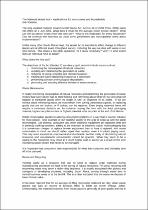JavaScript is disabled for your browser. Some features of this site may not work without it.
- ResearchSpace
- →
- Research Publications/Outputs
- →
- Journal Articles
- →
- View Item
| dc.contributor.author |
Oelofse, Suzanna HH

|
|
| dc.date.accessioned | 2010-09-10T07:56:15Z | |
| dc.date.available | 2010-09-10T07:56:15Z | |
| dc.date.issued | 2010-08 | |
| dc.identifier.citation | Oelofse, S.H.H. 2010. National Waste Act – implications for consumers and households. Resource, Vol. 12(3), pp 8-9 | en |
| dc.identifier.issn | 1680-4902 | |
| dc.identifier.uri | http://hdl.handle.net/10204/4346 | |
| dc.description | This is the author's Pre-Print version. The definitive version is published in the Resources Journal, Vol. 12(3), pp 8-9 | en |
| dc.description.abstract | The long awaited National Environmental Waste Act, Act No 59 of 2008 (RSA, 2008) came into effect on 1 July 2009. Unlike many other South African laws, the Waste Act is intended to effect change in different places and at different levels throughout society, including the way people deal with waste in their own homes. It is necessary that people change the way they manage waste in order to save natural resources and reduce their waste footprint. Many municipalities are running out of landfill airspace while new land for establishment of disposal facilities is scarce and expensive. Municipal waste management services are struggling to keep up with the increasing volumes of waste to be handled while communities are paying the price due to environmental and health impacts of waste. Waste management can no longer be considered to be the sole responsibility of municipalities and industry. Each and every citizen of South Africa has to take responsibility for the waste they generate, from the point of purchase of the consumer good to the point of final disposal of the resulting waste. Waste minimisation, reuse and recycling (including composting) needs to be introduced at all levels of society and become part of everyday life for all. All must lead by example and create a more waste aware society that think before they buy, repair before they replace, reuse what can be safely reused and recycle what is recyclable. In addition, reduction in waste volumes will alleviate the pressure on municipal service delivery and contribute to improved waste management service delivery | en |
| dc.language.iso | en | en |
| dc.subject | National Environmental Waste Act | en |
| dc.subject | Landfill airspace | en |
| dc.subject | Municipal waste | en |
| dc.subject | Recycling | en |
| dc.subject | Waste disposal | en |
| dc.subject | Waste refuse | en |
| dc.subject | Waste recycling | en |
| dc.title | National Waste Act – implications for consumers and households | en |
| dc.type | Article | en |
| dc.identifier.apacitation | Oelofse, S. H. (2010). National Waste Act – implications for consumers and households. http://hdl.handle.net/10204/4346 | en_ZA |
| dc.identifier.chicagocitation | Oelofse, Suzanna HH "National Waste Act – implications for consumers and households." (2010) http://hdl.handle.net/10204/4346 | en_ZA |
| dc.identifier.vancouvercitation | Oelofse SH. National Waste Act – implications for consumers and households. 2010; http://hdl.handle.net/10204/4346. | en_ZA |
| dc.identifier.ris | TY - Article AU - Oelofse, Suzanna HH AB - The long awaited National Environmental Waste Act, Act No 59 of 2008 (RSA, 2008) came into effect on 1 July 2009. Unlike many other South African laws, the Waste Act is intended to effect change in different places and at different levels throughout society, including the way people deal with waste in their own homes. It is necessary that people change the way they manage waste in order to save natural resources and reduce their waste footprint. Many municipalities are running out of landfill airspace while new land for establishment of disposal facilities is scarce and expensive. Municipal waste management services are struggling to keep up with the increasing volumes of waste to be handled while communities are paying the price due to environmental and health impacts of waste. Waste management can no longer be considered to be the sole responsibility of municipalities and industry. Each and every citizen of South Africa has to take responsibility for the waste they generate, from the point of purchase of the consumer good to the point of final disposal of the resulting waste. Waste minimisation, reuse and recycling (including composting) needs to be introduced at all levels of society and become part of everyday life for all. All must lead by example and create a more waste aware society that think before they buy, repair before they replace, reuse what can be safely reused and recycle what is recyclable. In addition, reduction in waste volumes will alleviate the pressure on municipal service delivery and contribute to improved waste management service delivery DA - 2010-08 DB - ResearchSpace DP - CSIR KW - National Environmental Waste Act KW - Landfill airspace KW - Municipal waste KW - Recycling KW - Waste disposal KW - Waste refuse KW - Waste recycling LK - https://researchspace.csir.co.za PY - 2010 SM - 1680-4902 T1 - National Waste Act – implications for consumers and households TI - National Waste Act – implications for consumers and households UR - http://hdl.handle.net/10204/4346 ER - | en_ZA |






